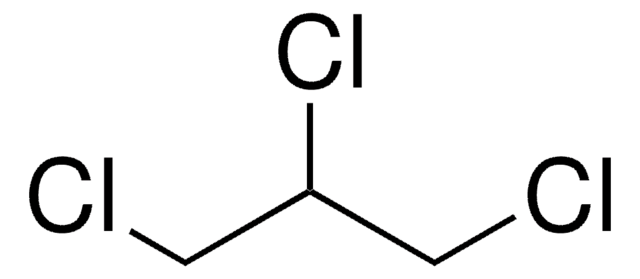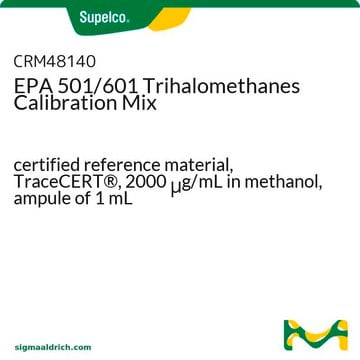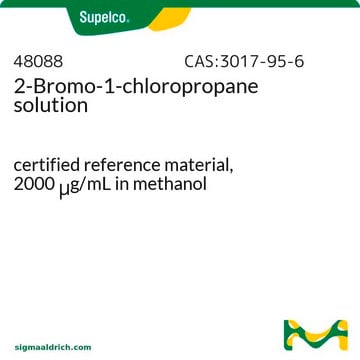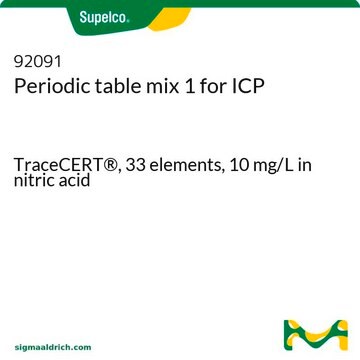推荐产品
等級
certified reference material
TraceCERT®
agency
EPA 552
產品線
TraceCERT®
CofA
current certificate can be downloaded
特點
standard type internal
包裝
ampule of 1 mL
濃度
200 μg/mL in methanol
技術
HPLC: suitable
gas chromatography (GC): suitable
應用
cleaning products
cosmetics
environmental
food and beverages
personal care
格式
single component solution
儲存溫度
2-8°C
InChI
1S/C3H5Cl3/c4-1-3(6)2-5/h3H,1-2H2
InChI 密鑰
CFXQEHVMCRXUSD-UHFFFAOYSA-N
正在寻找类似产品? 访问 产品对比指南
應用
Refer to the product′s Certificate of Analysis for more information on a suitable instrument technique. Contact Technical Service for further support.
其他說明
This Certified Reference Material (CRM) is produced and certified in accordance with ISO 17034 and ISO/IEC 17025. All information regarding the use of this CRM can be found on the certificate of analysis.
法律資訊
TraceCERT is a registered trademark of Merck KGaA, Darmstadt, Germany
訊號詞
Danger
危險分類
Acute Tox. 3 Dermal - Acute Tox. 3 Inhalation - Acute Tox. 3 Oral - Flam. Liq. 2 - STOT SE 1
儲存類別代碼
3 - Flammable liquids
水污染物質分類(WGK)
WGK 1
閃點(°F)
51.8 °F
閃點(°C)
11 °C
其他客户在看
1,2,3-Trichloropropane.
Report on carcinogens : carcinogen profiles, 10, 248-249 (2004-09-03)
Ghufrana Samin et al.
Environmental science and pollution research international, 19(8), 3067-3078 (2012-08-10)
1,2,3-Trichloropropane (TCP) is a persistent groundwater pollutant and a suspected human carcinogen. It is also is an industrial chemical waste that has been formed in large amounts during epichlorohydrin manufacture. In view of the spread of TCP via groundwater and
Eakalak Khan et al.
Journal of hazardous materials, 161(2-3), 1024-1034 (2008-05-27)
The mineralization and biodegradability increase and their combination of two traditional and two relatively new organic contaminants by Fenton reagents with three different types of iron, Fe(2+), Fe(3+), and Fe(0) were investigated. The traditional contaminants examined were trichloroethene (TCE) and
Vaishnavi Sarathy et al.
Environmental science & technology, 44(2), 787-793 (2009-12-17)
1,2,3-Trichloropropane (TCP) is an emerging contaminant because of increased recognition of its occurrence in groundwater, potential carcinogenicity, and resistance to natural attenuation. The physical and chemical properties of TCP make it difficult to remediate, with all conventional options being relatively
Jan G E van Leeuwen et al.
Chembiochem : a European journal of chemical biology, 13(1), 137-148 (2011-11-24)
We used directed evolution to obtain enantiocomplementary haloalkane dehalogenase variants that convert the toxic waste compound 1,2,3-trichloropropane (TCP) into highly enantioenriched (R)- or (S)-2,3-dichloropropan-1-ol, which can easily be converted into optically active epichlorohydrins-attractive intermediates for the synthesis of enantiopure fine
我们的科学家团队拥有各种研究领域经验,包括生命科学、材料科学、化学合成、色谱、分析及许多其他领域.
联系技术服务部门









